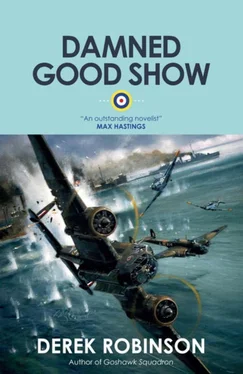Silk was not unhappy. He never allowed himself to be happy; that would have interfered with his cockpit routine. But Dog’s fuel tanks were lighter and she was moving faster. Not enough to escape a night fighter, and that was still a risk. He might have a chance to dodge into some clouds, but they were ugly monsters and if one turned out to be cu-nim, Dog with her bomb doors hanging down might not come out the other side.
Then flak began to break out like a skin disease. No searchlights, just flak. Someone down there was good at his job. “Wireless op, fire off flares,” Silk ordered. “Red and yellow.” Campbell moved fast. Within seconds he had the pistol in the flare chute. Red and yellow signals arced into the night.
The flak stopped. Silk counted to twenty. Still no flak. “And for my next trick,” he said.
Rollo pressed his intercom switch. “What was all that about?”
“Trick of the trade. Red and yellow flares used to be the Luftwaffe distress signal. Mind you, it doesn’t always work.”
It didn’t work ten minutes later. Woodman estimated they were near the German coast, and the sudden stabs of searchlights and ripples of flak and colored feelers of tracer suggested he was right. When the distress signal had no effect, Silk told the gunners to fire at the searchlights, and Rollo got some good shots of tracer streaking down from the front guns. Badger claimed to hit a searchlight. It certainly went out. He said, “Bull’s-eye!” Silk said something, but nobody heard him. A shell exploded underneath Dog and the blast hurled the Wellington up and over, until she was standing on a wingtip. Not for long. She was still flying but as she fell, her nose was too high. She stalled and, rather wearily, began to spin.
Silk did what his instructors had told him, years ago: close the throttles, centralize the stick, apply full rudder opposite to the spin, pause, then push the stick forward. The kite will dive and the spin will stop. Total failure. Maybe the controls had been hit. Maybe Wimpys were different. Meanwhile Dog kept rotating, rather ponderously, as if looking for a place to lie down. And kept falling. Several searchlights found her. Now the inside of the fuselage was painted a fierce silver-white. The camera team, the nav, the op, all covered their eyes. Silk and Mallaby were dazzled. Badger and Chubb were still firing. German bullets were punching holes in the fabric. It was a toss-up whether Dog crashed before the flak got her. Silk remembered Langham and the stabilized yaw.
He reached blindly for the throttles, shut the upper engine and opened the lower engine to maximum revs, combat limit, full boost, and commended his soul to Almighty God. The lower engine took command. The upper wing, its engine dragging instead of driving, dropped. The spin was killed. Dog lifted her tail and dived.
That was what Silk believed happened. But what did Silk know? He couldn’t see, he was flying by memory, by instinct, by feel. Maybe another shellburst had kicked the Wimpy out of its spin. Who can tell? Who cares? He harmonized the engines and eased the control column back until long experience told him the aircraft should be more or less level.
One advantage of being dazzled was that he couldn’t see how bad the flak was. By the time he’d got his sight back, the searchlights were losing him. Soon the flak was behind Dog, too.
“New course, skip,” the nav said. “Steer three three zero.”
Silk was surprised to hear from him. He had taken it for granted that half the crew were dead. He made an intercom check and everyone answered except Campbell, the wireless op. “He’s got a bit of steel in the backside,” Woodman reported. “Shell splinter, I expect. He’s on the bed.”
Mallaby left the cockpit to check how badly Campbell was hurt, and found him face-down. Rollo was holding a flashlight. Kate had the first-aid kit and she was scissoring through Campbell’s clothing. Already her hands were slippery with blood. “You’ve done this before,” Mallaby said.
“In the Blitz,” Rollo said. “We helped out, sometimes.”
Campbell’s right buttock had a long, deep cut. Blood was pulsing out of it. She ripped open a dressing and plugged the wound. “Press the edges together,” she told Mallaby. She cut strips of adhesive tape, wiped most of the blood off the buttock, and taped the wound shut. She covered it with a bigger dressing and taped that too. “Does it hurt much?” she asked Campbell.
He nodded once, slowly. His face had no color and his eyes were almost closed. She found the morphine and whacked it into his thigh. “Done,” she said. They covered him with blankets, put his oxygen mask in place, made sure he was breathing steadily.
Mallaby went back to the cockpit. “He’ll live,” he said.
“Any serious damage to the kite?”
“None that I could see, but I couldn’t see much. This torch is on its last legs. It’s black as your hat down the fuselage.”
“Tough old bird, the Wimpy.”
The second crossing of the North Sea was far worse than the first. Flak damage let the slipstream penetrate the fuselage and it bumped its icy blast into every corner. Campbell shivered, even though he seemed asleep. Kate lay alongside him, a barrier against the wind. Rollo sat on the floor. All his joints ached, except his feet. He had no sensation below the ankles. This must be what hell’s waiting room is like, he thought. Nothing to do and total freezing blackness to do it in. His brain was so dull that he altogether forgot the flasks of coffee, until the flashlight roused him and Woodman gave him a steaming mug. The coffee trickled down his gullet and promised better times ahead. Five minutes later his stomach felt as cold as stone again. He remembered the Benzedrine. He swallowed one tablet. It did nothing for his stomach. His feet were still numb.
Silk reckoned they were about halfway across the sea, when the compass developed a nervous tic. “Look,” he said to Mallaby. “I think it’s trying to tell us something.”
The tic became a wild flutter. “Looks like an earthquake, skip,” Mallaby said. “Either that or it’s desperate for a pee.”
The navigator’s master compass was just as bad. “Forget it,” Silk said. “The cloud’s not bad. I can see the North Star now and then. We can’t miss England.” Vibration from the bomb doors put a tremor in his voice that made him sound frail and elderly. But he was right. Silk steered by the North Star and forty minutes later, Badger saw the coast ahead. “Looks like Harwich, skip,” he said. “Bloody great estuary. Yes, Harwich. And there’s Felixstowe.”
“Defended area. Lots of balloons and bad-tempered sailors.” Silk swung the Wimpy to the right and flew parallel to the coast, losing height all the time.
“Orfordness coming up, skip.” Badger’s voice still shook with the vibration, but now it had the confidence of homecoming. “Lighthouse two miles ahead.”
“You should see this, Rollo,” Silk said. “Get it on film. 409 returns in glory. How we navigate to beat the band.”
Rollo got his camera and went forward. His brain was working briskly. All his senses were alert and alive. Benzedrine was doing its stuff.
“We turn left at the lighthouse,” Silk said. “Clever, eh?”
“Too dark for me, I’m afraid.”
“What a shame.” Silk wheeled Dog around the lighthouse and headed inland. “Now, then. In a moment you’ll see the big chimney of the cement factory.” Dog was down to six hundred feet and Rollo felt warmer. “There it is. Smell the smoke? I’d know it anywhere. Here we go… Over the chimney and dead ahead is the sugar beet factory in Bury St. Edmunds. One of my favorite landmarks. Or pinpoints, to be correct. Another delicious smell.” He chatted easily, pointing out church towers and windmills, scarcely visible in the dark, as Suffolk raced beneath. “At the sugar beet factory we find the railway, which forks left for Newmarket.” Silk flew alongside the line. “Nice shiny rails,” he said. “Who needs maps? Now, watch out for the lamps on the railway signals. At the third set of lamps we turn sharp left, and Coney Garth is just beyond a pub called the Lamb and Flag. You can’t miss it.”
Читать дальше












